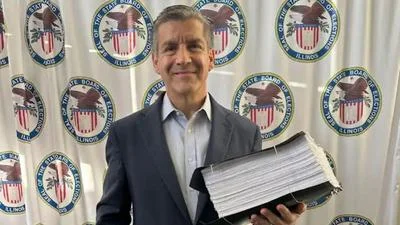After Illinois’ personal income tax was hiked just 2 points — from 3 to 5 percent — in early 2011, a record number of residents packed their bags, revealing what the Illinois Policy Institute termed “wealth flight.”
“(When) politicians choose short-term tax revenue gains over long-term stability, (the) short-term increase in tax revenue gained from higher tax rates is offset by the long-term loss of substantial portions of Illinois’ tax base,” the Institute’s Michael Lucci said recently as he detailed more recent departure numbers.
IRS data indicates that among taxpayers choosing to exit Illinois in 2014, average annual income had risen to $77,000 per person, yet the average annual earnings for incoming dwellers came to only $57,000 by comparison. This $20,000 disparity proved to be a record-breaker, as well as a harbinger of the ever-increasing trend that began when tax hikes were negated as the short-term take from tax increases was washed out by the overall loss of the state’s tax base when constituents fled the state.
“In short, during the tax-hike years, the average income of people leaving the state went up substantially while the average income of people entering the state barely went up at all,” Lucci said. In his analysis, he said not all Illinoisans left for the singular reason of tax increases. Many left because they had no jobs at all.
Statistics also show that Illinois lost over 30,000 millennials (net) in 2014. In addition to this youthful population segment, IRS data revealed that relatively affluent residents in Illinois were also packing up and heading out that same year, lured by more hospitable conditions in other states.
The most significant demographic figures extracted from IRS data revealed that young working-age adults -- millennials ages 26 to 34 — displayed the largest exodus growth, and those under age 26 also registered losses when compared with previous years.
The data not only indicated clearly delineated trends, but also further validated recent poll results from the Paul Simon Public Policy Institute that suggested most adults under 50 want to live elsewhere.
Examining the phenomenon of wealth flight over a three-year period from 2012-15, the Illinois Policy Institute noted that the state experienced its worst three years on record, forfeiting approximately $11.5 billion as taxpayers left for other states.
Lucci observed a phenomenon termed “outside lag,” wherein a certain perceived delay in repercussions occurs as policy changes take time to take root in the system. Consequently, 2011-era tax increases are now becoming a big factor in boosting out-migration.
In that light, four major manufacturers recently revealed plans to move elsewhere, with the Illinois Policy Institute calculating a loss of 541 jobs. Kankakee-based Merisant, manufacturer of the artificial sweetener Equal, is leaving the state, taking 90 jobs with it, and Lake Forest’s Colbert Packaging Corp. is headed to Wisconsin, where it will add 45 positions to its existing 65.
Additionally, Franklin Park’s Altria tobacco firm will relocate 300 jobs elsewhere, and Lake Villa’s Vonco Products LLC, a packager, is headed north to Wisconsin with 86 jobs. Finally, Caterpillar, while not folding, has announced major layoffs this year.
Illinois also bears the dubious distinction of having the nation’s most extreme negative income differential between incoming and outgoing residents. Even with Connecticut logging $16,000, Kansas netting $12,000, and Ohio and Washington, D.C., at $11,600 each, the Land of Lincoln exceeds even the top runner-up by approximately 25 percent.
Interestingly, of the top five states with positive income differentials concerning those leaving and moving in -- Florida, Wyoming, Nevada, South Carolina and Texas — four have no state income tax, and none imposes a death tax.
Suggesting that any additional tax hikes would simply continue to push residents out, Lucci said it would be advisable for Illinois officials “to rein in their spending habits” instead.
“Illinois policymakers need to confront the loss of wealth that followed the 2011 tax hike, which is likely still ongoing,” Lucci said. “Politicians must reckon with the fact that they have overspent and overpromised, and seek solutions that focus on reduced spending and more economic growth.”






 Alerts Sign-up
Alerts Sign-up